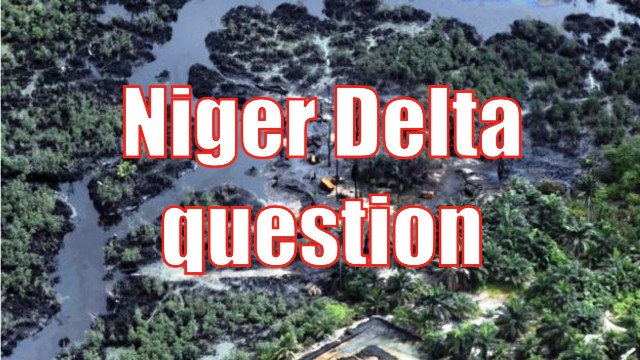Opinion
Inclusive Participation: Panacea To N’Delta Question

Usman Alabi in one of his articles on “addressing the Niger Delta question”, wrote that “the Niger Delta question stares us in the face and it will keep haunting us as a nation until it is addressed”.
Usman in his view, was simply stating the obvious. Apart from the way and manner youths of the Niger Delta present their grouse, any sane leader should concern himself with the legitimacy of their demands with a view to considering how a solution could be proffered.
Thursday December 1, 2016 afforded me the grace to access the plight of the inhabitants of the Niger Delta region of Nigeria. Apart from taking an optical exploration into the terrain, lives and times of the neighbourhood, dwellers through media documentary, the Niger Delta Women Social Forum (NDWSF) organised by Gender and Development Action (GADA), with support from the Dutch Embassy, provided a good platform for a panorama of the 16-point agenda of the Niger Delta leaders to the Federal Government of Nigeria.
The presidential amnesty programme, law and justice issues, the effect of increased military presence in the Niger Delta, the Ogoni clean up and environmental remediation, the maritime university issue, key regional critical infrastructure, security surveillance and protection of oil and gas infrastructure, relocation of administrative and operational headquarters of IOCs, economic development and empowerment and the inclusive participation in oil industry as well as ownership of oil blocks among others, formed the basis for the representation made by the Niger Delta leaders on November 1, 2016 to the President of the Federal Republic of Nigeria, Muhammadu Buhari.
Good work! In fairness to the delegates. However, there lies a big question mark underneath. Will this catalogue of needs of the Niger Deltans as represented by their leaders, if attended to, provide the requisite solution to the Niger Delta question?
For sure, Niger Delta has suffered insecurity for long, Niger Delta has been grossly exploited by the oil exploring companies over the years, but were these without any form of compensation even though it could be adjudged grossly inadequate?
What were the reasons behind the establishment of the Niger Delta Development Basin Authority, the Petroleum Trust Fund, the Niger Delta Development Commission and the Ministry of Niger Delta by various past administrations?
Not quite long, Senator Peter Nwaoboshi, a member of the senate committee on Niger Delta Affairs, was quoted as saying that “a lot of money has been voted for the execution of projects but very little is seen on ground” for which his committee was mandated to carry out a holistic investigation into the activities of the Niger Delta Development Commission to determine how well it has performed.
In addition to previous developmental agencies established to address the Niger Delta question, the administration of former President Olusegun Obasanjo, in the year 2000, established the Niger Delta Development Commission (NDDC) with the sole mandate of developing the oil rich Niger Delta region.
In September 2008, late president Umaru Yar’Adua announced the formation of a Niger Delta Ministry, with the NigerDelta Development Commission to become a parastatal under the ministry. This was largely in response to the demands of the Niger Deltans most notably the Ijaws and Ogonis, justified by the extensive environmental degradation and pollution from oil activities.
From past experiences, one is poised to think that the Niger Delta question can better be addressed from within. It is not in doubt that the region has witnessed money flow through the pipes laid under ground without a grasp of it, a reason for which its youths turned restive over night with new titles as pipeline vandals.
The crave and craze for a firm grip of the inestimable wealth passing through the pipes have been suspected to constitute over 80% of the reason behind the pollution of our environment for which much clamour is made for its clean up.
Thus, the writer is most fascinated about the clauses on economic development and empowerment as well as the inclusive participation of the Niger Deltans in oil business as featured by our leaders in their presentation to the president of the Federal Republic of Nigeria.
Sidelining the goose that lays the golden egg from the control and management of the eggs, is tantamount to jeopardizing the fate of the eggs. If what is being catalogued constitutes the aches and pains of the Niger Delta, then get it involved in the management of its resources, and you can be sure of the proverbial dog that is not tempted by the bone hung round its neck.
Sylvia ThankGod – Amadi
Opinion
NDDC: Time To Illuminate Homes

Opinion
When Democracy Becomes Too Expensive

Opinion
Righteous Leadership Still Thrives

-
Politics3 days ago
2027: NIGERIANS FAULT INEC ON DIGITAL MEMBERSHIP REGISTER DIRECTIVE
-

 Environment3 days ago
Environment3 days agoLAWMA Director Says Sweeping Reforms Have Improved Waste Collection
-
Politics3 days ago
LP Crisis: Ex-NWC Member Dumps Dumps Abure Faction
-

 Politics3 days ago
Politics3 days agoUmahi Dismisses Allegations On Social Media, Insists On Projects Delivery
-

 Sports3 days ago
Sports3 days agoAbia Not Sure To Secure continental Ticket
-
Sports3 days ago
La Liga: Yamal Records First Career Hat-trick
-
Politics3 days ago
NATASHA ELECTRIC VEHICLES INITIATIVE IN KOGI CENTRAL
-
Politics3 days ago
IT’S A LIE, G-5 GOVS DIDN’T WIN ELECTION FOR TINUBU – SOWUNMI

